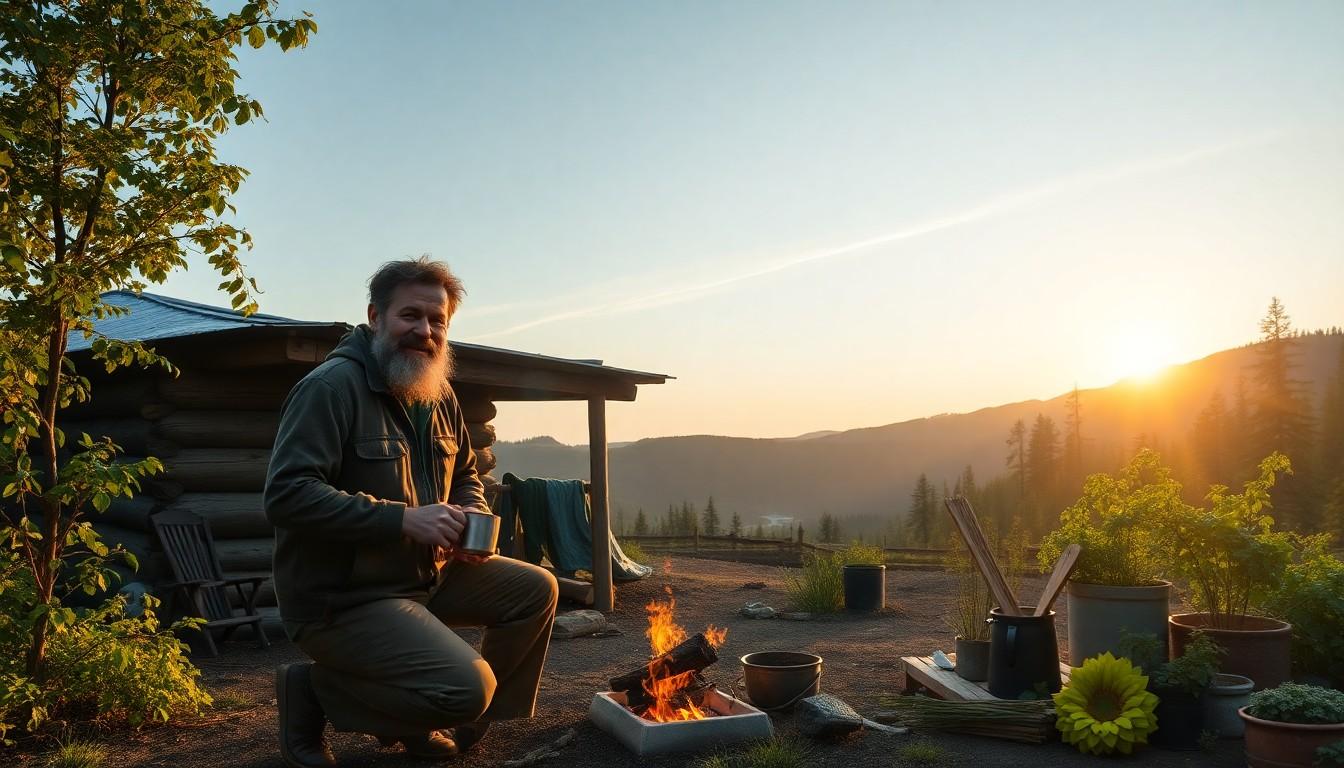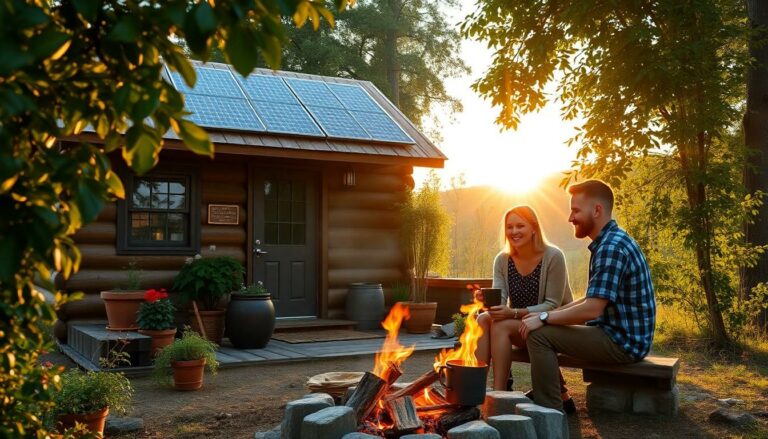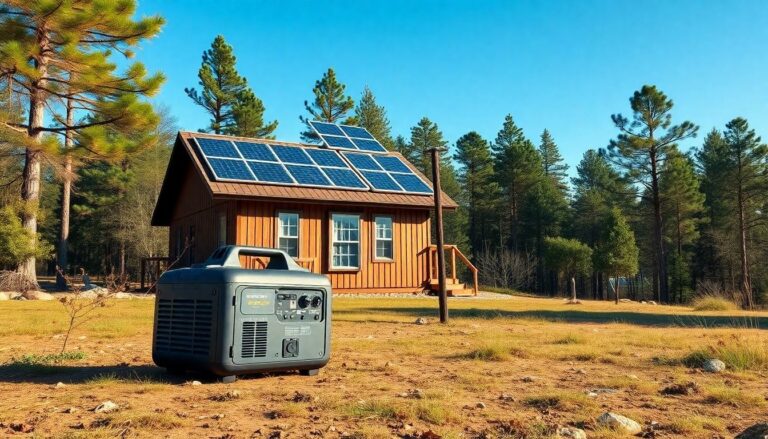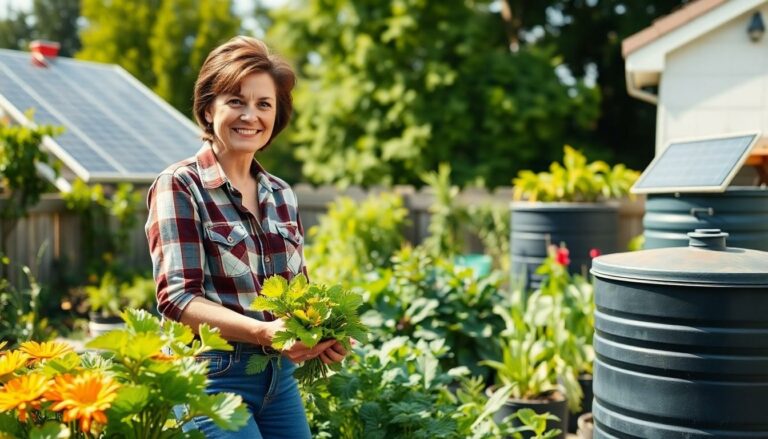Imagine waking up to the sound of chirping birds instead of blaring alarms, sipping coffee brewed over an open fire, and living life on your own terms. Off-grid living isn’t just a trend; it’s a lifestyle that promises freedom from the hustle and bustle of modern society. But how do you make this dream a reality? Enter the ultimate off-grid living book, your new best friend in the wild.
Off Grid Living Book
Off grid living represents a self-sufficient lifestyle that prioritizes independence from traditional utilities. This approach often involves generating one’s own power and sourcing food directly from sustainable practices. Individuals engaging in off grid living adopt various methods, including solar energy and rainwater collection, to fulfill their daily needs.
Books focused on off grid living provide essential guidance on practical skills. Topics covered in these books range from constructing shelters to growing food organically. Specific techniques mentioned in these resources equip individuals with knowledge to face challenges associated with this lifestyle.
Moreover, thriving in an off grid environment requires adaptability and resourcefulness. Engaging with the natural surroundings fosters a sense of community and connection. Many practitioners share their experiences through online forums, adding to the wealth of information available.
Preparation plays a crucial role in successfully transitioning to this lifestyle. Planning includes understanding local regulations, assessing land suitability, and determining sustainable practices. The depth of information in off grid living books makes them valuable for both beginners and those seeking to refine their skills.
Diverse skills like woodworking, gardening, and animal husbandry are often essential. Practicing these skills enhances self-reliance, making daily life more manageable. Readers often find inspiration in success stories highlighted in off grid living literature, which showcases achievable goals and fosters motivation.
The allure of off grid living lies in its promise of freedom and simplicity. Simple pleasures become a priority, enriching daily life with experiences that foster mental well-being. Embracing this lifestyle offers a unique opportunity to reconnect with nature and rediscover the joys of self-sufficiency.
Key Themes in Off Grid Living Books

Off-grid living books emphasize key themes integral to embracing a self-sufficient lifestyle. Readers learn to cultivate skills that enhance autonomy and sustainability.
Self-Sufficiency
Self-sufficiency forms the backbone of off-grid living. Individuals gain insights on producing food, collecting water, and generating energy. Growing vegetables and fruits organically in backyard gardens boosts food security. Learning to raise livestock enhances protein sources while reducing dependency on store-bought products. Practical skills like woodworking for shelter construction improve self-reliance. Mastering methods for preserving food helps lessen waste. Each of these skills promotes a sense of empowerment, ensuring individuals can meet their needs without reliance on external systems. Overall, self-sufficiency is foundational for successful off-grid living.
Sustainability
Sustainability plays a crucial role in off-grid living principles. Books detail approaches to minimize ecological footprints while optimizing resources. Readers explore renewable energy options, such as solar panels and wind turbines, for power generation. Implementing methods like rainwater harvesting conserves water and encourages responsible usage. Sustainable gardening practices, including permaculture techniques, yield year-round crops while preserving soil integrity. Choosing eco-friendly materials for construction reduces environmental impact. Education on waste management and recycling fosters responsible living. Understanding these practices enhances long-term viability and connection to nature. Sustainability ensures a harmonious existence within natural surroundings.
Popular Off Grid Living Books
Various off-grid living books exist to support individuals seeking self-sufficiency and sustainability. These resources provide practical guidance and essential skills to enhance independence.
Book Recommendations
“Off Grid” by Nick Rosen offers insights on living entirely off-grid, featuring personal stories and expert advice. “The Renewable Energy Handbook” by William H. Kemp outlines methods for harnessing wind, solar, and water power effectively. “The Self-Sufficient Life and How to Live It” by John Seymour covers essential topics such as gardening, animal care, and household management, making it an invaluable resource for aspiring off-grid residents. “Shepherding the Heart” by Darlene M. Haver provides a unique perspective on family and community aspects of off-grid living. These selections empower readers to embrace off-grid experiences fully.
Author Highlights
Nick Rosen highlights practical aspects of off-grid living through firsthand accounts, making complex ideas accessible for newcomers. William H. Kemp brings engineering expertise to the renewable energy discussion, focusing on practical applications and systems. John Seymour, a pioneer in the self-sufficiency movement, combines traditional knowledge with modern techniques, ensuring readers receive well-rounded information. Darlene M. Haver emphasizes the importance of family dynamics and community support in her writings, enriching the off-grid living narrative with emotional connections. These authors contribute valuable perspectives to the off-grid living literature.
Benefits of Off Grid Living
Off-grid living offers numerous advantages, emphasizing independence and sustainability. Increased self-sufficiency often leads to reduced reliance on utility companies. Financial savings arise from generating energy and growing food, making it a cost-effective choice over time.
Achieving a deeper connection with nature enhances overall well-being. Natural surroundings contribute to mental peace, with fresh air and outdoor activities promoting physical health. Lower stress levels often result from escaping the hustle of urban environments.
Environmental impact decreases considerably with off-grid practices. Utilizing renewable energy sources like solar and wind reduces carbon footprints, aligning with eco-friendly goals. Collecting rainwater for use further minimizes consumption of municipal water, promoting sustainability.
Off-grid living encourages skill development and self-reliance. Learning to garden, raise animals, and preserve food fosters independence. Practical skills gained through hands-on experience often lead to increased confidence and resourcefulness in overcoming challenges.
Community building flourishes within off-grid environments. Like-minded individuals often share resources, knowledge, and support. Collaborative efforts enhance social connections, creating tight-knit communities focused on sustainability.
Flexibility in living arrangements becomes apparent in off-grid lifestyles. Customizing homes and land utilization allows individuals to tailor their living space to personal preferences. This adaptability often leads to improved satisfaction and comfort.
Ultimately, off-grid living cultivates a lifestyle centered on freedom and simplicity. Embracing this way of life fulfills personal values regarding sustainability and independence while providing enriching daily experiences.
Challenges of Off Grid Living
Off-grid living presents distinct challenges that individuals must navigate. Isolation often characterizes this lifestyle, making access to supplies, services, and emergency assistance difficult. Limited communication options arise, particularly in remote areas with poor cell service or internet connectivity.
Weather conditions significantly impact off-grid living as well. Harsh winters may require significant energy for heating and increased food storage. Summers can bring water shortages or extreme temperatures that necessitate plans for cooling and irrigation.
Resource management creates another challenge. Generating power sustainably involves ongoing maintenance of solar panels or wind turbines, requiring time and often financial investment. Water collection systems must be reliable and efficient, demanding attention to quality and availability.
Waste disposal issues can arise due to limited infrastructure. Developing effective composting or recycling systems becomes essential for maintaining hygiene and environmental health. This complexity adds another layer of responsibility.
Skill acquisition proves crucial in overcoming obstacles. Individuals encounter a learning curve when mastering tasks such as gardening, building, and basic repairs. Continuous education in sustainability practices helps bridge gaps in knowledge.
Local regulations may complicate the transition to off-grid living. Understanding zoning laws or building codes becomes vital, as violations can lead to fines or other penalties. Researching local resources can facilitate compliance with legal requirements.
Community ties often play a role, providing emotional support and practical assistance. Forming connections with neighbors fosters resource sharing and camaraderie, which eases the isolation inherent in off-grid living. Ultimately, addressing these challenges requires resilience and adaptability, key traits for successful off-grid living.
Nurturing a Deeper Connection
Embracing off-grid living offers a unique opportunity to reconnect with nature and cultivate self-sufficiency. With the right resources such as comprehensive off-grid living books, individuals can navigate the challenges and reap the rewards of this fulfilling lifestyle. These books not only provide practical skills but also inspire a mindset focused on sustainability and independence.
As readers explore the various aspects of off-grid living, they’ll find a supportive community ready to share knowledge and experiences. This journey toward a simpler life fosters resilience and adaptability, making it possible to thrive in harmony with the environment. Ultimately, off-grid living is about creating a life that aligns with personal values while nurturing a deeper connection to the world around us.




